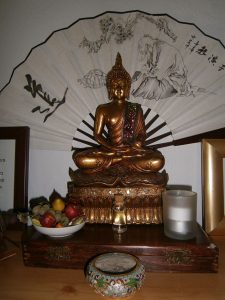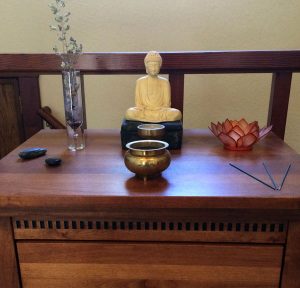The foundations of meditation, mindfulness and keeping the Precepts benefit the individual practitioner, as well as his or her family, co-workers, friends and acquaintances. Family life is an excellent ground for training, as are relationships, workplace situations and the common interactions that make up our days. Lay practice offers the means of mindfulness in all of these situations, and provides opportunities to train in contemporary life. It is particularly helpful to connect with a Priory or Meditation Group whenever possible, coming to the Abbey, Priory or Meditation Group for a retreat, or to connect online to Dharma teaching and spiritual counseling.
DAILY LIFE
Relationships and situations at home and at work offer daily opportunities for mindfulness and practice of the Precepts. With the Precepts as our guide for expression, intention, and purpose, we can simply look, acknowledge that which arises, and relinquish our grasping it as it passes away. Coming to see Buddha Nature in all that is, in what and who we like and don’t like; learning to see with a compassionate eye and an open heart are some of the fruits of lay training in daily life. The article by Rev. Master Jisho Perry, Applying Meditation to Everyday Life is available for more guidance. The talks below by Rev. Master Kodo Kay also provide practical suggestions for deepening one’s training in our families, relationships, work and professional life, and in the ways we relax and enjoy ourselves.
Rev. Master Kodo Kay
The Offering of Lay Training Retreat July, 2015
Welcoming Tea and Introduction 43 min/17MB
Taking Refuge 59 min/19MB
Cease From Evil 54 min/21MB
Thanks to Achalanatha 48 min/15MB
 HOME ALTARS
HOME ALTARS
Home altars serve as a point of focus for one’s daily practice. Whether in a separate meditation room or on a bookshelf in the bedroom, the altar is an invitation to bow and a reminder that our practice is a deeply meaningful part of our lives. Home altars typically include a statue or an image of the Buddha or of a Bodhisattva – Kanzeon (the Bodhisattva of Compassion), Jizo (the Bodhisattva who protects the weak and the vulnerable), Manjusri (the Bodhisattva of Wisdom), Maitreya (the Buddha yet to come) – as well as a candle or light, flowers, incense (and somewhere to place the lit incense), and an offering cup of water. These items may be as simple as one’s means allow.

The statue or the image should be the central figure on the altar. The water cup is placed before the statue and symbolizes the cleansing aspect of the Eternal. The candle or light symbolizes the Light of the Dharma and is usually placed on the right side of the altar. The flowers – most often artificial – are placed on the right. It is an important part of one’s practice to keep the altar clean and dust free, as well as to have fresh water and incense. Having a home altar is one means of “bringing the practice home”. bolize the joy of training as well as the blossoming of Enlightenment. They are usually placed on the left side of the altar. The incense is the traditional offering at an altar and represents one’s offerings of gratitude, as well as one’s intentions and aspiration. Your Place of Meditation by Rev. Master Shiko Rom describes in greater detail the elements of a home altar and its uses.
CHILDREN AND FAMILIES
According to tradition, the Buddha was 7 years old when he had his first experience of meditation. We encourage family practice whether at home or at the Abbey. Children are welcome at festival ceremonies. Several times a year we hold a Dharma School for young children up through teenagers. Children have an intuitive inclination to sit quietly, and this is something that parents and children can do together in front of the home altar. There are some excellent Buddhist books for children in the Guest House Library, and congregation members are welcome to borrow these for use at home. Rev. Master Jiyu-Kennett reflected on children and families in her article Children and Meditation.
EXPRESSIONS OF GENEROSITY
The spirit of dana flows throughout the practice of Serene Reflection Meditation. Offerings to and from the monastic community teach not only the spirit of generosity, but open the heart to both the giving and receiving of the teachings.
Friends of Shasta Abbey (FOSA) is an organization of lay trainees established to carry forward the ancient Buddhist tradition of interdependence between the monastic and lay communities. In gratitude for the monks’ generosity in offering the Dharma, FOSA helps provide skills and resources to support and enhance monastic life at Shasta Abbey. FOSA contributes revenue from its gift shop to directly benefit the monastery. FOSA also contributes practical help and professional expertise to the monastery. In this way, the monks, the Friends of Shasta Abbey and the entire lay Sangha work together to support each other’s spiritual training. Rev. Master Daizui MacPhillamy offers insight on this in his article Spiritual Simplicity.
There are also many opportunities to directly contribute expertise in completing special projects and with ongoing needs of the monastery. These include sewing, transcribing Dharma talks, help in the kitchen, help with building projects, help with on-going maintenance projects, recycling, providing rides for traveling monks, picking up monks at airports, helping in the Guest House, gardening, pruning, help with Sacristy projects, and many more. Some of these projects can be done at a distance, with communication via mail or the internet. Other projects might include a visit and stay at the Abbey. All efforts are gratefully appreciated. For further information please contact the Prior.
The Lay Sangha of Mount Shasta area offer short-term support to their members in the local vicinity who have a medical illness or need help after an operation. For further information about this please contact the Prior or the Guestmaster.
Every-minute Meditation by Rev. Master Daizui MacPhillamy addresses how we bring our meditation practice to all aspects of our daily life.
Spiritual Simplicity by Rev. Master Daizui MacPhillamy
FOR FURTHER INFORMATION
To explore how you can build and strengthen your practice as a lay person, contact the Guestmaster.

